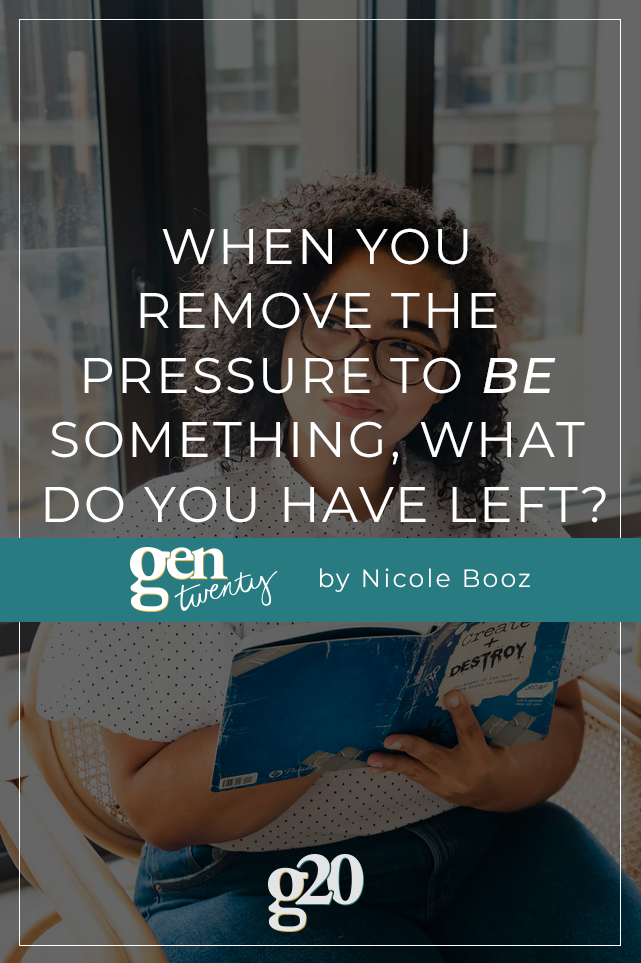Full disclosure: I started writing this post during the summer of 2016. I was really struggling to figure out a balance between improving myself and being myself. I love learning new things and growing, but sometimes that intentional growth is overwhelming. Everything becomes so systematic that it is no longer fun and you lose sight of the passions that drive you.

The internet seems to be explosive with articles like “How To Find Your Purpose” “Why Knowing Your Purpose Will Improve Your Life.” Heck, we even have a whole category dedicated to self-development here on GenTwenty.
Though we write about purpose and intentionality, at the end of the day, our goal is for you to care about yourself and your future. Ultimately, we just want you to be happy. Finding that happiness is a balance between knowing when to push yourself and knowing when to be yourself.
As someone who is trying to find my way through my twenties and into adulthood, the word “purpose” is starting to overwhelm me.
I was on Pinterest just a few days ago and within two scrolls through my home feed, I saw three “Personal Development Challenges for This Year.” Three.
That’s overwhelming even for me — a person who loves personal development.
I see these types of things everywhere (they are the norm in my industry so I may see them more than the average person). I constantly feel pressured to read self-development books and to spend my time doing the life-enriching things everyone else says I should be doing. It’s gotten to the point where I feel guilty when I’m not doing those things.
When there’s an overwhelming amount of content out there, it’s hard to cut through the noise. I would never encourage you to not be your best self, not to live life intentionally or not live your life on your own terms. Truly, I want you to care. I want you to reach your goals, and make your dreams a reality.
But I don’t want you to lose yourself in the process. I don’t want you to forget about the things you love doing just because someone said you should be doing something else.
It’s been on my mind lately, that while all of these challenges, articles, e-courses, webinars, etc. have good intentions, they won’t give you answers.
You have to live, you have to take action on your own, you have to figure out what matters to you, and make mistakes–no one else can do that for you.
Every now and then I have daydreams of deleting all of my social media accounts and doing things because I want to do them, not because I want to post them on Instagram or because I was inspired by Pinterest. Maybe it’s just me, but lately, I’m constantly feeling pressured to be something other than what I already am.
It was this idea that got me thinking:
If you take away the pressure to be something, what do you have left?
As a personal example, I haven’t been reading lately, which is completely unlike me. I usually read for 30 minutes to an hour every day without fail.
When I looked at my “to read” pile, it’s 70 percent self-development books that were recommended to me. I had to ask myself, why was this the case? Do I genuinely have an interest in reading these or would I rather spend my time indulging in fictional stories and characters?
It’s not that I don’t want to read these books, it’s just not what I need right now. I gave myself permission to read fiction. Instead of dreading picking up a book, I finally couldn’t put one time for the first time in ages. It was refreshing and I felt like myself again.
If you weren’t listening to what someone else was telling you that you should be doing, what would you be doing?
If there was no internet or no social media to tell me who I need to be or what I need to do next, what would I be doing with my time?
Back to the title of this post: when you strip away what society, your parents, your mentor tell you to be or do, what remains of you? Sometimes, it’s hard to say. I had to go back and ask myself tough questions to gain some clarity. It sounds silly, but thinking of myself in the third person really made a difference. It gave me a new, objective perspective on myself. Here are a few examples:
- Nicole has an afternoon free, what will she be doing?
- Is Nicole a morning person or an evening person?
- What shows does she laugh the most at?
- What was her least favorite book that she read in the past year?
- Who does she love hanging out with?
- What does Nicole get really passionate and excited about?
It’s a simple strategy that helps you remove your own emotions from the equation and forget about the pressure of “should.” It’s easy to forget ourselves when we’re trying to improve ourselves.
When we take away the pressure of expectations and/or who we wish we could be, who is the person that’s left?
